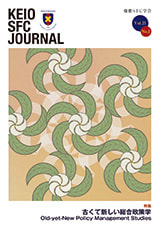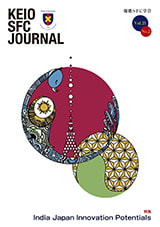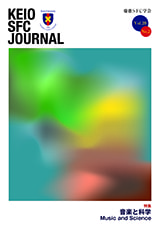- HOME
- KEIO SFC JOURNAL
- Vol.21 No.1

KEIO SFC JOURNAL Vol.21 No.1 Old-yet-New Policy Management Studies
published on 2021.09
Old-yet-New Policy Management Studies
-
Foreword
Download this article (PDF): SFCJ21-1-00.pdfMotohiro Tsuchiya (Vice-President, Keio University / Professor, Graduate School of Media and Governance, Keio University)
-
Do Your Best in Silence : Looking Back on the History of Faculty of Policy Management at Keio Shonan Fujisawa Campus (SFC)
Download this article (PDF): SFCJ21-1-01.pdfNaoyuki Agawa (Former Dean, Faculty of Policy Management, Keio University) Takeshi Kawazoe (Former Dean, Faculty of Policy Management, Keio University) Jiro Kokuryo (Professor, Faculty of Policy Management, Keio University / Former Dean, Faculty of Policy Management, Keio University) MC: Motohiro Tsuchiya (Vice-President, Keio University / Former Dean, Faculty of Policy Management, Keio University)
-
[Review articles]
The Development and Transformation of Policy Sciences ―Implications for Policy Studies in Japan
Takao Akiyoshi (Professor, Faculty of Law, Chuo University) The objective of this paper is to discuss the development and transformation of policy sciences and to examine its implications for policy studies in Japan. Policy sciences, which was proposed after World War II, was institutionalized as policy studies in the 1970s. However, due to the recognition of the problem of rational policy making, a methodological shift was made in the late 1980s, and policy sciences based on post-positivism was proposed. This development of policy sciences suggests the following issues for policy studies in Japan: (1) development of methods for analyzing problem structures, (2) development of methods for multidimensional policy analysis, and (3) examination of policy-making system.
Download this article (PDF): SFCJ21-1-02.pdf -
[Research articles]
Policy Management in Japan ―Past Reflections and Future Outlook
Shinichi Ueyama (Professor, Faculty of Policy Management, Keio University) Ayumu Nishimura (Master’s Program, Graduate School of Media and Governance, Keio University) The Japanese term for “Policy Management”, “Sogo Seisaku”, was created in 1990 when a new department was established at Keio University to support social policy change. Over years, the program has enabled researchers to leverage case studies related to real-world policy issues. The program also changed policy studies from pure academic one to a multi-disciplinary, pragmatic and future-looking one. The program also stimulated practical insights and perspectives that have allowed for increased involvement in major policy change initiatives. Moving forward, the study of policy management will incorporate accumulated real-world experience to allow more rigorous approach which will include an emphasis on “societal issues” and encompass areas such as “stakeholders”, “location”, “policy lifecycle”, “realm”, “data”. To be successful, “Policy Management” must take a multidimensional, integrated and analytical approach to develop solutions to our most complex and dynamic policy issues.
Download this article (PDF): SFCJ21-1-03.pdf -
[Research articles]
Community and Policy Management Approach ―Its Transition and Current Issues
Gen Miyagaki (Professor, Faculty of Policy Management, Keio University) Although the concept of community may not be often associated with the term “Policy Management”, both the concept of community and its policies are suitable for comprehensive policy studies because they have been approached from a crossdisciplinary perspective and normative decisions have been made on issues. This paper aims to look back at Japanese community policy, confirming this multifaceted concept, and consider the roles that have been expected in various fields of human services, as well as their possibilities and challenges.
Download this article (PDF): SFCJ21-1-04.pdf -
[Research articles]
The “China Factor” in Japan-EU Relations
Michito Tsuruoka (Associate Professor, Faculty of Policy Management, Keio University) This article examines the role of the “China factor” in Japan-EU relations. The way in which Japan and the EU address the challenges posed by the rise of China affects the direction of the relationship. The “China factor” could work in both positive and negative ways – promoting or harming Japan-EU cooperation. In general, while it was largely a factor prohibiting cooperation due to large perception gaps on China between Japan and Europe, it is nowadays becoming a factor promoting cooperation as a result of a more alignment of Japanese and European perceptions on China.
Download this article (PDF): SFCJ21-1-05.pdf -
[Review articles]
Governments, Central Banks and Digital Currency ―Study of Policy Chain Reaction on Currency Hegemony
Akio Fujii (Chair of Editorial Board, Nikkei) Digital currencies spread after the global financial crisis in 2008. The Bitcoin and Facebook’s Libra initiatives have shocked governments and central banks around the world. China has accelerated the development of the digital yuan, which has driven the world’s central banks to the CBDC experiment. The chain reaction over digital currencies is also a race for currency hegemony in the 21st century.
Download this article (PDF): SFCJ21-1-06.pdf
-
[Practical reports]
The 10 Years of Kuchinoerabu Island and the Students of SFC ―Real Stories of the Students
Shinnosuke Tominaga (Staff, the Ministry of Internal Affairs and Communications / Researcher, Keio Research Institute at SFC) The Kuchinoerabu Project, of the Yoko Hasebe Laboratory, at Keio University has been collaborating with Kuchinoerabu island of Yakushima township in Kagoshima prefecture for 10 years, since 2011. This thesis introduces the background and history of the project and shows the importance of sharing the stories of people concerned and understanding the process to build a sustainable partnership and relationships between the islanders and university students who have been involved in medium to long-term fieldwork activities.
Download this article (PDF): SFCJ21-1-07.pdf
-
[Research articles]
Second Generation Muslims in Japan ―Their Perceived Internal Conflicts Made Apparent Through Interviews
Yoshimi Qureshi (Doctoral Program, Graduate School of Media and Governance, Keio University) Muslim families are formed in Japan since an influx of Muslim immigrants in the 1980s. Second-generation Muslims born into such homes are nurtured in Islamic values. Among them, some from their school-age become deeply troubled after recognizing differences between the values of their family and that of their peers. In their adolescence, they contemplate how they are to come to terms with the Muslim identity, attempting to identify who and what they are. In this paper, the internal struggles they face as a minority, as well as their efforts to overcome such challenges will be examined through interviews.
Download this article (PDF): SFCJ21-1-08.pdf -
[Research articles]
Roles of Neighborhood Associations in Japan on Cross-sector Collaborations Between Citizens and Municipalities ―Case Study from Collective Reelocation in Kesennuma, Miyagi
Yuya Takahashi (Fourth year, Faculty of Policy Management, Keio University) In Japan, Neighborhood Associations (NHAs) have engaged in local politics by obtaining subcontracts from municipalities. While newer forms of civic participation, such as civic councils (machizukuri kyogikai), emerged, the NHAs-municipalities relationship remains unchanged. This article analyzes factors which encourage cross-sector collaborations involving NHAs. By reviewing the policy formation process of collective relocation in Osawa district, Miyagi, in the aftermath of the 2011 Tohoku Earthquake and Tsunami, the article reveals that cross-sector collaborations with NHA were stimulated by a combination of intense interests in the local citizen groups and participation of urban planners out of the district.
Download this article (PDF): SFCJ21-1-09.pdf

